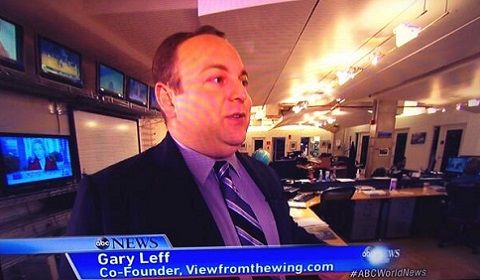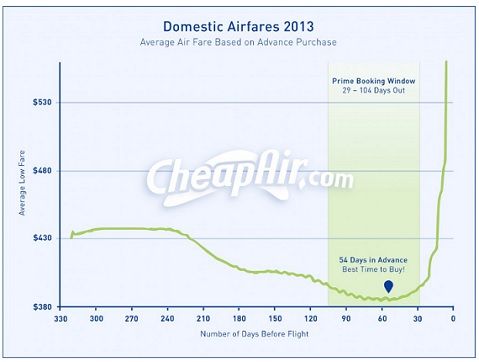I was on ABC World News Tonight this evening talking about when to buy airline tickets in order to ge the cheapest fare.

The segment was keyed off of the Cheapair.com study on when airfares are cheapest and their soundbite is that you should buy domestic airfares 54 days prior to travel.
Usually these studies are pretty bad, telling you to wait until midnight on a Tuesday night. This one is actually pretty good, it’s just more nuanced than the 54 day soundbite suggests.
Why 54 Days Out Is Not a Silver Bullet
It isn’t as simple as waiting until 54 days prior to departure to buy, and reading through what Cheapair’s data actually says they’d agree with me. But there are simple tips on how and when to get the best deal on airfare.
The Cheapair study is looking at aggregate historical averages for every route and fare and travel date across 2013. When they find that on average buying 54 days in advance got the best deal, but there’s really a range of when fares are the cheapest and the data doesn’t mean 54 days is predictive for the future or for any given route or day of travel.

Buy Domestic Airfare Between 1 and 4 Months Prior to Departure
What it means is that what we already knew to be true is still true. Start to look at leisure travel about 3 months out. This study says there is a window between 1 and 4 months out where prices are the lowest for domestic airfares, but it’s not one single day all of the time. (And in fact, they find that peak holiday travel is cheapest even earlier than that, and international trips are too.)
How Airfares Are Calculated
Airfares are a combination of fare rules and prices for a given city pair. These change but largely tell you if you have to buy 7 or 14 or 21 days prior to departure, have a Saturday stay, or are restricted to travel on certain days of the week like Tuesday, Wednesday, or Saturday (the lightest travel days for most routes).
If you meet those rules you need the specific flight you’re looking at to be available with inventory that matches the fare.
Airlines want to sell each seat for as much as possible but not have seats go out empty because then they get nothing for the seat.
Don’t Buy Too Far Out — A Year In Advance is Too Much
As the study shows buying a year out is usually expensive. Airlines don’t know what seats will go empty and consumers insisting on buying then are probably not that price sensitive. It is often the cruise crowd wanting to lock in their plans.
Except for the highest of demand dates — the Superbowl, peak Spring Break in Florida — buying when schedules load is far too early.
Do Plan Holiday and International Travel Far In Advance
Peak holidays sell cheap seats earlier largely because those flih hits do sell out. Start looking five months out.
International tickets are cheapest also farther out than domestic generally.
Waiting Until the Last Minute is Risky – Try to Avoid It
Waiting until close to departure is a bad idea. Sometimes there are deals especially on travel package sites. Look for bundles with rental cars. But they are usually not as good as what you could have done with proper advance purchase.
There used to be plenty of flights with empty seats, and those might get dumped cheap at the last minute. But flights now are running full so you may not see those last minute sales.
That’s another reason why the best exact day will vary year-to-year, because the economy and competition among airlines matter — empty flights will usually get cheaper, and full flights will get more expensive most of the time.
So what should you do?
Here are the top three things you should know.
- The best advice is to know what tickets usually cost for your route. If prices are below that — buy. If prices are higher than usual you probably want to wait, especially if you’re still more than a month away from travel.
- Start considering purchasing when your plans are firm. Don’t purchase earlier because $200 (or higher) change fees will ea you alive. Don’t start later because of rising prices for close-in departures. Don’t stress about the deal you could have gotten. . Pounce when the deal is good enough.
- Comparison shop at Kayak.com or Hipmunk.com, sites that do the work of checking other airfare sites for you. If you really want to watch for sales, follow TheFlightDeal.com
If you want to go far beyond that, it can get complicated — the airlines have made it complicated, and that creates opportunities — there’s more reading to do.
- You can join the 30,000+ people who see these deals and analysis every day — sign up to receive posts by email (just one e-mail per day) or subscribe to the RSS feed. It’s free. You can also follow me on Twitter for the latest deals. Don’t miss out!


AS gives free changes to tix until 60 days out.
Now I know why. 😉
I’ve been buying cut-rate airline tickets for decades and, honestly, all these studies are worthless. The best time to buy airline tickets are when they are cheap. And it’s not really predictable when they will be cheap.
It’s important to remember that, even among leisure travelers, there are different types of ticket buyers. There are the folks who MUST go: like your brother is getting married on May 17, and you must be there then. Then there are the folks who want to go to a specific destination, but there plans are more flexible — like you want to go visit your parents in Ft. Lauderdale this spring, but you’ll wait for a deal. And then there are the total discretionary travelers: they’ll go practically anywhere if the price is right.
Obviously, your ticket buying strategy is going to vary dramatically what camp you’re in. That said, it’s crazy to tell people not to buy too far in advance. I’ve bought plenty of transcon tickets 10 and 11 months in advance if they’re sub-$200 roundtrip. The risk in such situations is your plans might change; not that the price will go down. In contrast, if your brother is getting married, perhaps you should buy that conveniently-timed $400 transcon when you see it. It all depends how badly you want to be there, and when.
What’s the best way of figuring out what flights usually cost for a given route?
Wouldn’t the best advice for a Jetblue and Southwest tickets be to buy as soon as you know your travel dates and then monitor prices via the airline website or Yapta until the pride drops and then get a refund for the difference? That way you are pretty much guaranteed the lowest price for that flight on that airline.
Gary, who decides what goes under your name during those interviews? I saw “milepoint.com” and this one has “view from the wing”. Do you submit that, or the interviewer chooses? Just curious…
@andrew – ultimately whomever does the interview or produces it chooses, sometimes they ask me, sometimes i ask them, but i don’t really have control
@Mark- I get Southwest but doesn’t Jet Blue charge $75 plus diff in fare for changes > 60 days out (and more <60 days) so why book Jet Blue any earlier than other airlines?
http://tinyurl.com/mf4zcwl
Gary – I second Victor’s question. Where do we find route price history?
Great segment. Hat tip when doing anything on camera: don’t wear any colored shirts aside from light blue. Ever. In fact, just don’t buy them. Stick to white, light blue, and light patterns.
It will polish the look and not make you look like you manage a chain restaurant or starred as one of Tony’s lieutenants in The Sopranos. I don’t mean to be critical, just passing along constructive criticism. Otherwise, keep up the great work!
“A man should look as if he had bought his clothes with intelligence, put them on with care, and then forgotten all about them.”
– Hardy Amies
@BusinessFlyer For real? The “wear blue on TV advice” is decades old. I don’t think dressing like a politician about to be indicted is a suitable look for a blogger. The lavender shirt is fine.